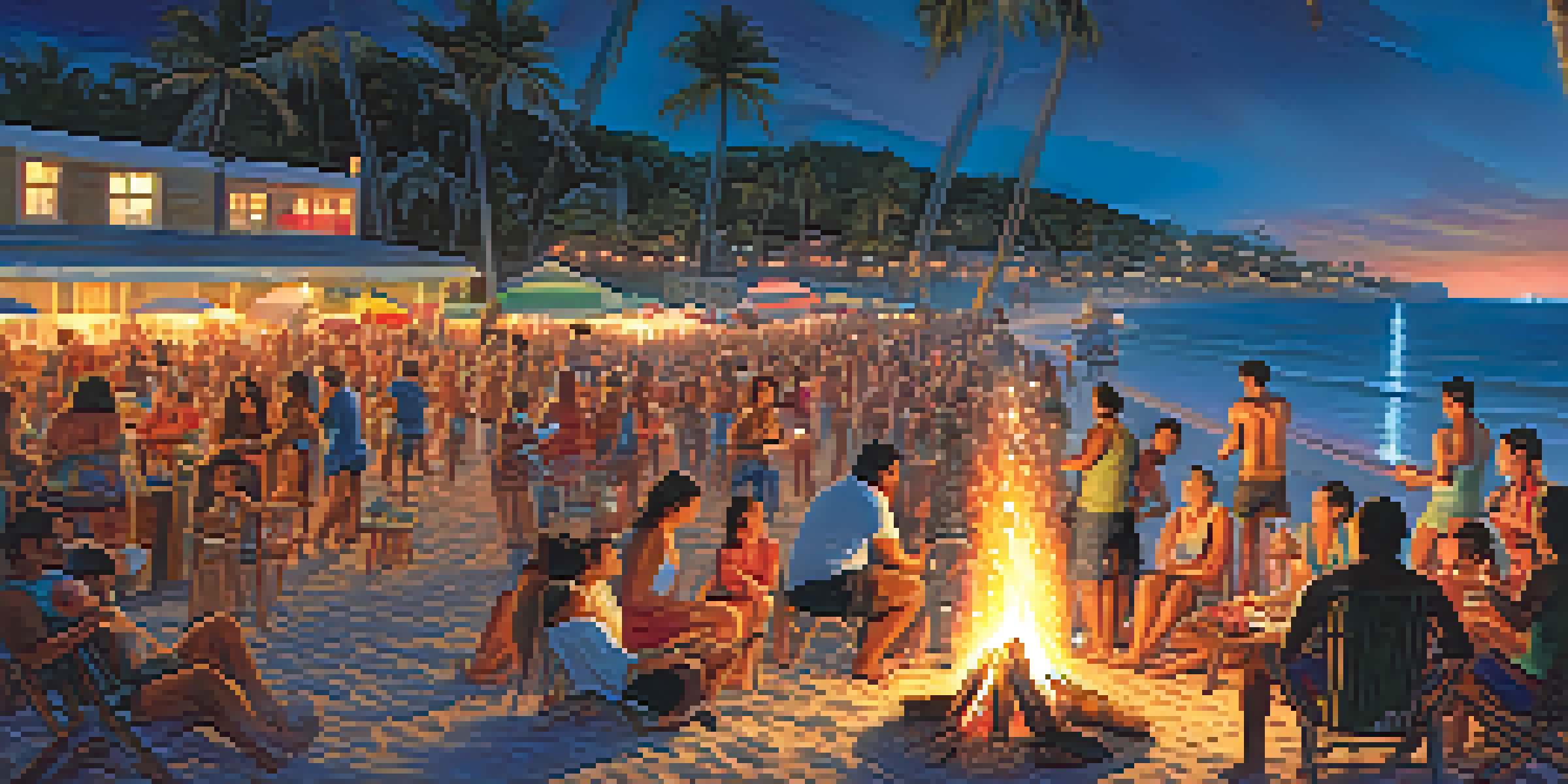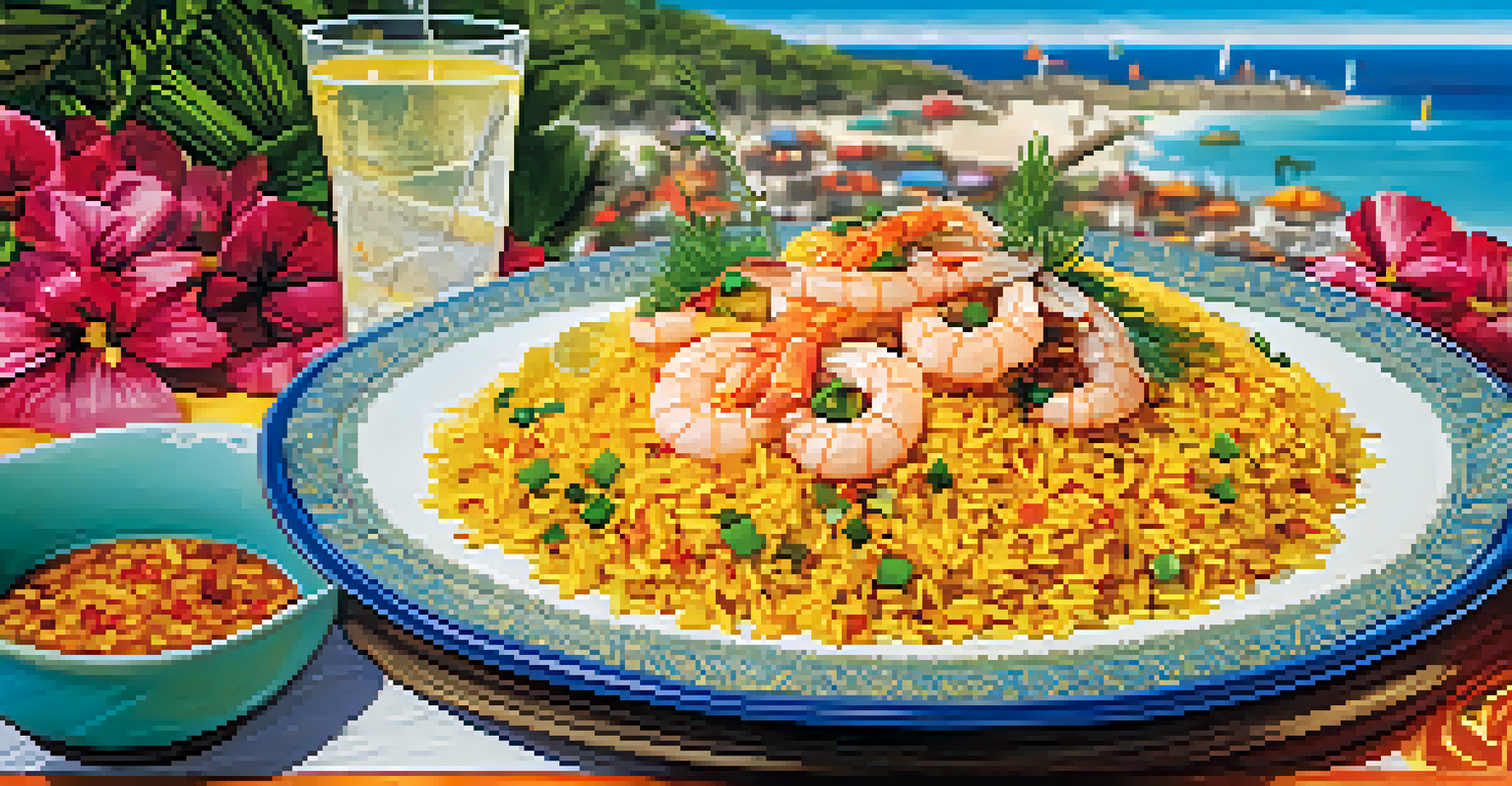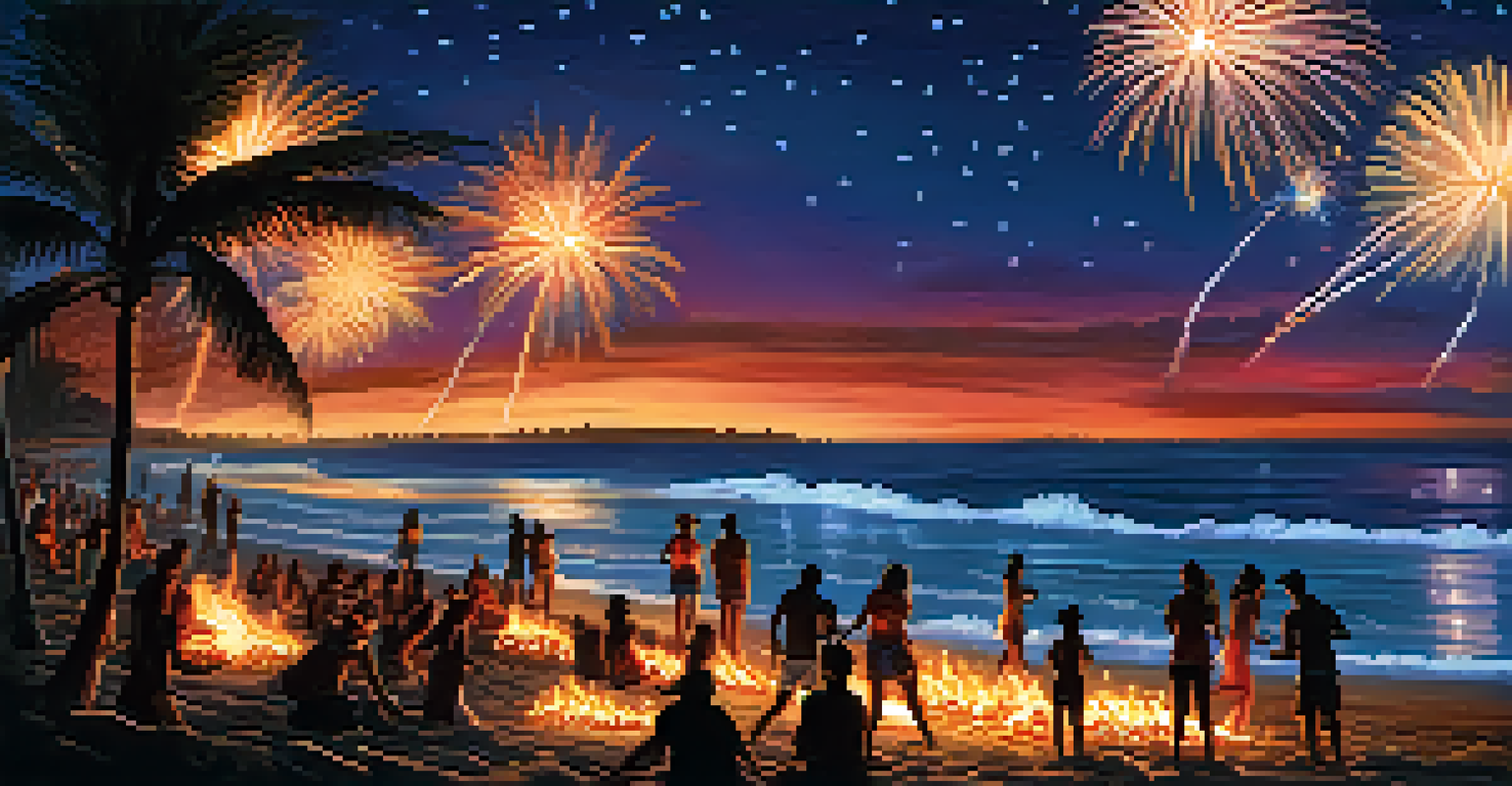Festival of San Juan: Celebrating the Summer Solstice in Spain

The Origins of the Festival of San Juan
The Festival of San Juan, celebrated on the night of June 23rd, has deep roots in ancient traditions. Originally a pagan festival, it marks the summer solstice, the longest day of the year, symbolizing light's victory over darkness. As Christianity spread, the festival was adapted to honor St. John the Baptist, intertwining local customs with religious significance.
Festivals are the heartbeat of a community, bringing people together to celebrate traditions and shared experiences.
In coastal regions, particularly in places like Alicante and Barcelona, the festival has evolved into a vibrant celebration filled with bonfires, fireworks, and beach parties. The essence of this event lies in community and connection, drawing people together to celebrate the arrival of summer. It's a time for locals and visitors alike to embrace joy and revelry under the stars.
The festival not only celebrates the solstice but also serves as a reminder of the importance of light and renewal in life. The flames of the bonfires symbolize purification and the burning away of past negativity, allowing participants to welcome the warmth and positivity of summer ahead.
Traditions and Rituals of the Festival
One of the most iconic traditions of the Festival of San Juan is the lighting of bonfires along the beaches. Locals gather around these fires, often sharing stories, food, and laughter, creating a sense of community. The act of jumping over the flames is believed to bring good luck and is a thrilling experience, especially for younger revelers.

Another essential ritual involves the use of firecrackers and fireworks, which light up the night sky in a spectacular display. The lively sounds and colors create an atmosphere of excitement and celebration, making it a feast for the senses. It's common to see families and friends come together to enjoy the show, capturing memories with photos and laughter.
Celebrating Light and Renewal
The Festival of San Juan marks the summer solstice with bonfires and rituals that symbolize the triumph of light over darkness and the welcoming of summer.
Additionally, many participants make special offerings to the sea, often leaving flowers or food items as a tribute to the water’s protective spirit. This practice highlights the festival's connection to nature and the elements, reminding everyone to respect and cherish the world around them. Through these customs, the Festival of San Juan fosters a sense of gratitude and appreciation for life's simple pleasures.
Food and Drink: A Culinary Celebration
No festival in Spain is complete without delicious food, and the Festival of San Juan is no exception. Traditional dishes often include seafood, grilled meats, and regional delicacies that reflect the coastal culture. Many families prepare special meals to enjoy by the beach, enhancing the festive atmosphere with delightful flavors.
In every culture, light symbolizes hope, and fire represents renewal, especially during a time of celebration.
One popular dish served during this time is 'arroz a banda,' a flavorful rice dish typically made with fish and saffron. It’s a perfect representation of the Mediterranean diet, showcasing the region's fresh ingredients. Sharing these meals with friends and family adds an element of warmth and togetherness to the celebration.
Drinks also play a significant role in the festivities, with local wines and refreshing cocktails flowing freely. The 'agua de Valencia,' a cocktail made with orange juice, cava, and vodka, is particularly popular and embodies the spirit of summer. As the night goes on, the clinking of glasses and cheerful toasts create an infectious sense of joy that encapsulates the essence of the festival.
Festivities Across Spain: Regional Variations
While the Festival of San Juan is celebrated nationwide, each region in Spain adds its unique flair to the festivities. In Galicia, for example, the celebration is known as 'Noite de San Xoán,' where locals gather on the beaches to light bonfires and enjoy traditional food. The emphasis here is on the connection to nature and the ocean, with rituals that invoke blessings for the upcoming summer.
In Catalonia, the festival is marked by a mix of fire and water, with celebrations often featuring both bonfires and beach parties. The vibrant atmosphere is amplified by music, dancing, and communal gatherings that allow people of all ages to participate. Here, the festival serves as a celebration of identity and cultural heritage.
Culinary Delights of San Juan
Traditional foods and refreshing drinks, such as 'arroz a banda' and 'agua de Valencia,' play a significant role in enhancing the festive atmosphere during the celebrations.
In contrast, the Balearic Islands host a more intimate version of the festival, where smaller towns come together for community celebrations. With fewer crowds and a more traditional approach, these gatherings focus on preserving the local customs and fostering close-knit connections among residents. This diversity in celebration demonstrates how the Festival of San Juan reflects the rich tapestry of Spanish culture.
The Spiritual Significance of San Juan
The Festival of San Juan carries profound spiritual significance, rooted in ancient beliefs about the solstice. The night is seen as a time of transformation, where participants can release their past and embrace new beginnings. Many people take part in cleansing rituals, such as jumping over fires or washing their faces with seawater, believing these acts will bring them health and prosperity.
The bonfires symbolize the triumph of light over darkness, a metaphor for overcoming challenges and embracing positivity. For many, this night is a chance to reflect on personal growth and set intentions for the months ahead. The spiritual aspect of the festival encourages individuals to connect with themselves and their surroundings on a deeper level.
Moreover, the festival serves as a reminder of the importance of community and shared experiences. By coming together to celebrate, people strengthen their bonds and create lasting memories. This sense of unity and support is what truly embodies the spirit of San Juan, making it a cherished tradition in Spanish culture.
Modern-Day Celebrations and Global Influence
In recent years, the Festival of San Juan has gained international recognition, attracting visitors from around the world. As more people discover the beauty of this celebration, it has adapted to incorporate modern influences while retaining its traditional roots. Cities like Barcelona and Alicante host large-scale events that blend local customs with contemporary music and entertainment.
Social media plays a significant role in promoting the festival, with many using platforms like Instagram and TikTok to share their experiences. This digital presence has helped to showcase the vibrant atmosphere and unique traditions of San Juan, making it accessible to a global audience. The festival’s popularity continues to grow, drawing curious travelers eager to participate in the festivities.
Regional Variations in Celebration
Different regions in Spain add their unique customs to the Festival of San Juan, showcasing the rich cultural diversity and communal spirit of the event.
Despite the changes, the heart of the Festival of San Juan remains unchanged. It's still a time for community, celebration, and the joy of summer. As the world continues to evolve, this cherished tradition stands as a testament to the enduring power of culture and connection.
Tips for Celebrating the Festival of San Juan
If you're planning to experience the Festival of San Juan, preparation is key! Arriving early to secure a good spot on the beach is essential, as crowds can swell with both locals and tourists eager to join the festivities. Bring along blankets, snacks, and drinks to enjoy with friends while waiting for the bonfires to be lit.
Dress comfortably and be mindful of the fire hazards associated with the bonfires. Wearing sandals and clothing that you don’t mind getting a little smoky is a good idea. Don’t forget to bring your camera or smartphone to capture the magic of the night, from the flickering flames to the dazzling fireworks overhead.

Lastly, immerse yourself in the local culture by participating in community activities. Engage with locals, learn about their traditions, and don’t hesitate to join in on the fun! Whether it’s dancing, singing, or simply sharing stories, embracing the spirit of the festival will undoubtedly enhance your experience and create unforgettable memories.